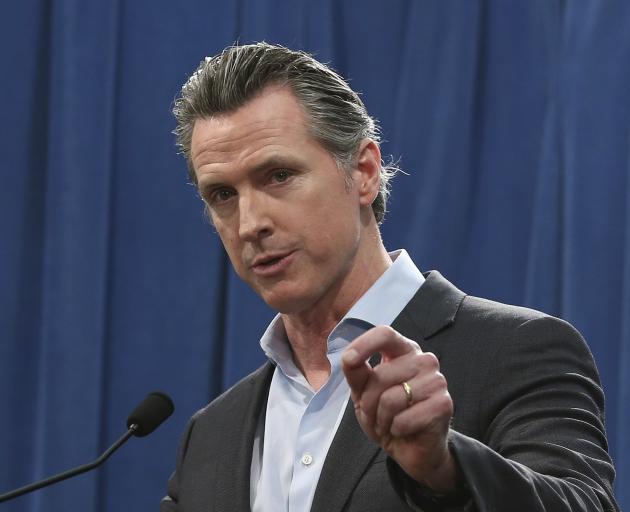
The 737 inmates on California's death row are getting a reprieve from the US state's governor, who plans to sign an executive order placing a moratorium on executions.
Gavin Newsom is also withdrawing the lethal injection regulations that death penalty opponents already have tied up in courts and shuttering the new execution chamber at San Quentin State Prison that has never been used.
"The intentional killing of another person is wrong and as governor, I will not oversee the execution of any individual," he said in prepared remarks.
Newsom called the death penalty "a failure" that "has discriminated against defendants who are mentally ill, black and brown, or cannot afford expensive legal representation." He also said innocent people have been wrongly convicted and sometimes put to death.
California has the nation's largest number of death row inmates. It has not executed anyone since 2006, when Arnold Schwarzenegger was governor. And though voters in 2016 narrowly approved a ballot measure to speed up the punishment, no condemned inmate faced imminent execution.

Since California's last execution, its death row population has grown to house one of every four condemned inmates in the United States. They include Scott Peterson, whose trial for killing his wife Laci riveted the country, and Richard Davis, who kidnapped 12-year-old Polly Klaas during a slumber party and strangled her.
Newsom "is usurping the express will of California voters and substituting his personal preferences via this hasty and ill-considered moratorium on the death penalty," said Michele Hanisee, president of the Association of Deputy (Los Angeles County) District Attorneys.
But Alison Parker, US managing director at Human Rights Watch, praised Newsom's "great courage and leadership in ending the cruel, costly, and unfair practice of executing prisoners," calling for other states to follow California's lead.
The American Civil Liberties Union called it "a watershed moment in the fight for racial equity and equal justice for all." Justin Brooks, director of the California Innocence Project, lauded Newsom for ending the risk of executing someone who is innocent.
Kent Scheidegger, legal director of the Criminal Justice Legal Foundation, which has been fighting in court to force the state to resume executions, said blocking Newsom's move may be difficult.
"Reprieves, the governor does have the power to do that. That doesn't make it the right thing to do," Scheidegger said. "At this time I don't see a legal challenge to the reprieve."
However, he said prohibiting corrections officials from preparing to carry out executions "is patently illegal" under the 2016 ballot measure.
Stanislaus County District Attorney Birgit Fladager, president of the California District Attorneys Association, also criticised Newsom for circumventing the will of a majority of voters.
But he had support from Democratic lawmakers including Sen. Scott Wiener of San Francisco and Assemblywoman Lorena Gonzalez of San Diego, who praised Newsom for doing "what's right, even when it's tough," in Gonzalez's words.
Aides said Newsom's power to grant reprieves is written into the state Constitution and that he is not altering any convictions or allowing any condemned inmate a chance at an early release.
A governor needs approval from the state Supreme Court to pardon or commute the sentence of anyone twice convicted of a felony, and the justices last year blocked several clemency requests by former Governor Jerry Brown that did not involve condemned inmates.
Other governors also have enacted moratoriums. Republican Illinois Governor George Ryan was the first in 2000 and later was followed by Pennsylvania, Washington and Oregon. Illinois ultimately outlawed executions, as did Washington.
Newsom said the death penalty isn't a deterrent, wastes taxpayer dollars and is flawed because it is "irreversible and irreparable in the event of human error." It's also costly - California has spent $US5 billion ($NZ7.3 billion) since 1978 on its death row, he said.
More than six in 10 condemned California inmates are minorities, which his office cited as proof of racial disparities in who is sentenced to die. Since 1973, five California inmates who were sentenced to death were later exonerated, his office said.
Seventy-nine condemned California inmates have died of natural causes since the state reinstated capital punishment in 1978. Another 26 committed suicide. California has executed 13 inmates, while two were executed in other states.
Newsom's office said 25 condemned inmates have exhausted all of their appeals and could have faced execution if the courts approved the state's new lethal injection method.












